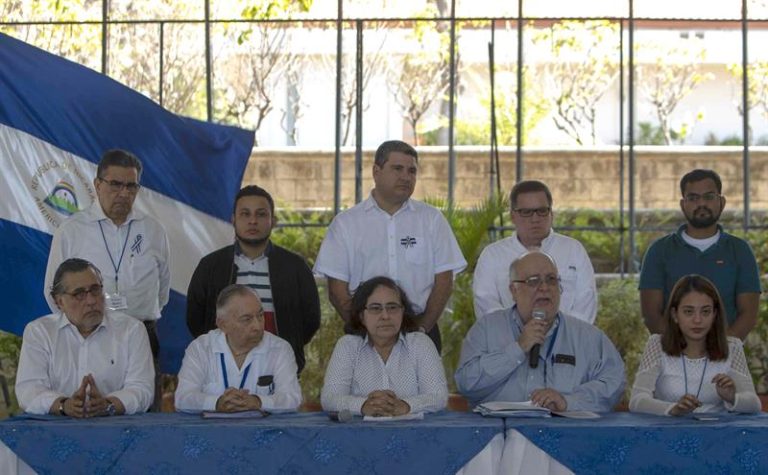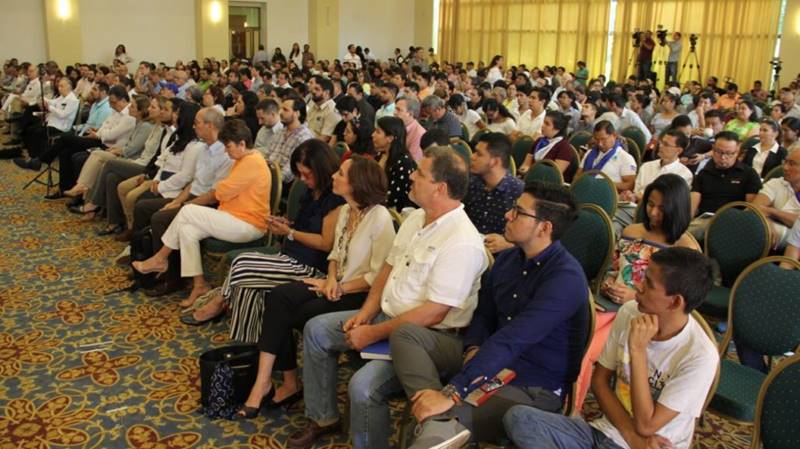1 de septiembre 2019

Children of Exile: The Births “Sowing Hope” in the Camp of Nicaraguan Farmers

PUBLICIDAD 1M
PUBLICIDAD 4D
PUBLICIDAD 5D
Change and non-partisanship of the Electoral Council, transparency in the counting of the votes, no reelection and restoring the second electoral round

The Civic Alliance for Justice and Democracy presented this Thursday a proposal of thirteen reforms to the electoral system, which in turn includes five constitutional changes to move up general, municipal and regional elections, prohibit reelection and establish a runoff election.
The Alliance presented the proposal in the forum “Building national political consensus on electoral reforms,” held in a Managua hotel. During the time that the opponents were gathered, the Special Operations Unit of the Police surrounded and besieged the premises, harassing a citizens’ protest which assembled after the event finished.
The electoral reform proposal of the Civic Alliance includes constitutional reforms not only to anticipate elections, but to establish that, to win the presidency, 50%+1 of the votes are needed, or else a runoff will be established between the two candidates that get the highest number of votes. At present, a candidate can gain the presidency by only obtaining 35% of the votes, and a difference of five points over the second-place candidate, established by the pact between Daniel Ortega and Arnoldo Aleman in 2000.
Likewise, the Civic Alliance proposes non-presidential reelection (until now allowed indefinitely), the prohibition of continuous succession by the president’s spouse, and the independence of the legislative seats with respect to the party or Alliance.
Apart from the constitutional reforms, the Civic Alliance proposes 13 specific points, beginning with the “election of new electoral authorities that generate trust” and the “non-partisanship of electoral structures.”
The Alliance recommends opening the system of political participation, establishing the right of registration of alliances that can choose their name and legal representative freely, as well as the simplification of the procedure for granting legal status to parties” to end the discretion with which they are administered by the Ortega-Murillo dictatorship.

During the presentation of the Civic Alliance electoral reforms proposal.
It also includes reforms to ensure electoral transparency in the counting of votes such as the accreditation of party representatives in the JRV (voting locations) and CV (voting tabulation stations) by the different political parties, without the discretion of the Supreme Electoral Council.
Other measures aim to restore the right to national and international electoral observation, electoral material that builds confidence in the system, an auditable, verifiable and observed transmission of results system; as well as a system for publishing results in real time, updating of the voter registry.
As for the Autonomous Regions of the North and South Caribbean Coast, they propose adjusting the electoral reforms to the particularities of the Caribbean Coast.
The Civic Alliance also advocates regulations for the different electoral processes including the appeals and complaint processes, and activation of voting procedures for Nicaraguans abroad.
“Our electoral system is still deficient, so as a Civic Alliance we reaffirm our commitment assumed in the negotiating table’s agenda to reach reforms that will restore confidence in the Electoral System within Nicaraguan citizens through the implementation of the recommendations or observations of the electoral support mission and other proposals for reform that guarantee anticipated, free, fair, transparent and observed electoral processes,” explained the Civic Alliance.
The opponents’ proposal occurs at the same time that the Ortega regime struggles to impose a unilateral electoral reform with the Organization of American States (OAS) and the allied parties, in which they intend to exclude the Civic Alliance from the negotiations.
The United States Ambassador to this inter-American forum and member of the OAS High-Level Diplomatic Commission for Nicaragua, Carlos Trujillo, said Thursday that his country will not accept the reform proposal by the Ortega-Murillo, much less “without the endorsement of civil society.”
“In order to have a credible and solid system, reforms to the Electoral Law, the Constitution, the Law of Political Parties are needed. An electoral procedures code, an Electoral Power Organic Law and a National Identity Card Institute must be created,” said the Civic Alliance. “We have set priorities, and our proposal only presents reforms to the Electoral Law and the Constitution. The rest will be done with a democratic government.”
Violeta Granera, of the political council of the Blue and White National Unity, welcomed the electoral reform proposal of the Civic Alliance, because it “opens a national debate” on this issue.
“The Blue and White National Unity also has a proposal and we will begin to discuss it with the rest of organizations to reach consensus. That is the approach,” Granera said. “This Alliance proposal is a first presentation and we are going to analyze it. The idea is to open a debate to find out how to harmonize all the proposals.”
Granera pointed out that Nicaragua has decided to “fight the battle” against the dictatorship through civic means and civil disobedience, which implies “forcing the dictator Daniel Ortega with national and international pressure” to accept the opposition considerations on how the electoral reform should take place.
“We have to give all the battles together because there is no more time. Nicaragua’s suffering is too much. That implies being prepared for all scenarios. It already implies having consensus reforms ready to force Ortega that these are the electoral reforms. We reject Ortega’s intention to return to his rigged reform which will not solve the problem,” Granera insisted.
Roberto Courtney, Director of Ethics and Transparency (EyT), said that the proposal for electoral reform of the Civic Alliance will be part of a “government plan.” Three quarters of that will be left behind in a negotiation, said the expert, but the proposal does touch on the necessary aspects…we must see if the “minimums” are achieved,” Courtney said.
The Director of EyT stressed that the proposal of the Civic Alliance is clear about the idea of creating a competitive electoral context like the one of 1990, with “pure and hard” electoral observation, financing opportunities for all contenders, including private financing since the government could thwart State funding; and above all the change of the magistrates of the Electoral Power.
Courtney believes it is positive that the OAS returns to a role in electoral reform, whether or not its actions are to the liking of the Civic Alliance. “It is good to have the OAS in. Let’s say that Ortega gives conditions in exchange for the lifting of international sanctions…then, if Ortega deviates from compliance before the end of the electoral process, the OAS could intervene so that the sanctions return,” Courtney analyzed.
PUBLICIDAD 3M
Periodista. Destaca en cobertura a violaciones de derechos humanos: desplazamiento forzado, tráfico ilegal en territorios indígenas, medio ambiente, conflictos mineros y ejecuciones extrajudiciales. Premio Iberoamericano Rey de España 2018.
PUBLICIDAD 3D